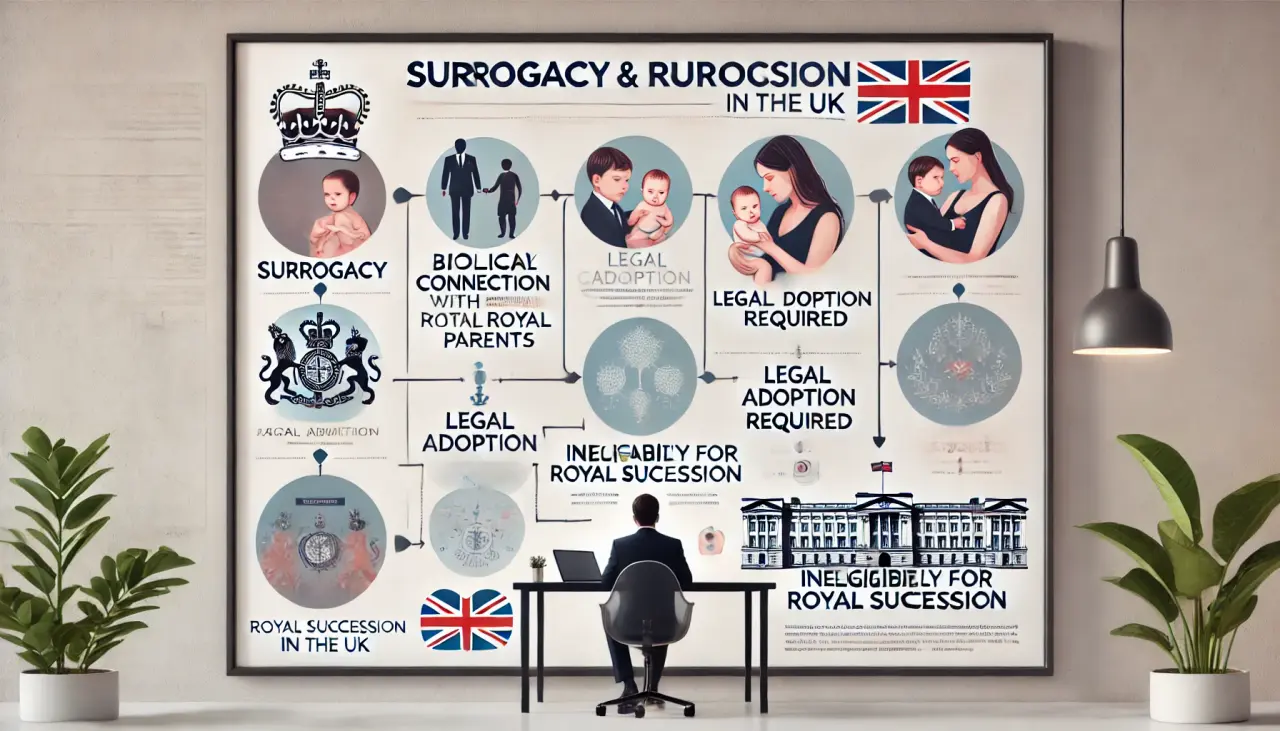
Surrogacy and Royal Succession: Is a Child Born Through Surrogacy Eligible to Inherit a Royal Title?
No.
Under current UK laws concerning surrogacy and royal succession, a child born through surrogacy, even if biologically related to the Royal parents, does not automatically have a claim to the throne or the right to inherit a royal title. This scenario arises from the intricate legal framework governing succession, which involves not just biological ties but also the process of legal parenthood.
Surrogacy and Royal Succession: Legal Considerations
In the UK, royal succession is governed by specific rules, which require a legal connection between the heir and the royal family. While surrogacy can provide a biological link to the Royal parents, it does not automatically confer a legal status that guarantees inclusion in the royal line of succession.
Under British surrogacy law, the surrogate mother is officially named as the birth mother on the birth certificate. If the surrogate mother is married, her husband is usually recorded as the child’s father unless he formally disagrees. In this context, the Royal parents would need to undergo an adoption process to establish a legal relationship with the child.
Adoption and Royal Succession Laws
According to royal succession adoption laws, adopted children are not eligible to inherit a royal title or assume a place in the line of succession. This rule remains unchanged regardless of the biological connection between the child and the Royal parents. Therefore, even if a surrogate child is biologically related to the royals, the adoption process effectively changes the child’s legal status, removing them from succession considerations.
Why Surrogacy Complicates Royal Succession
One of the key elements of royal succession is the legal parent-child relationship, which ensures that only those who are legally recognized as the offspring of the Royal family can claim a title or succession rights. The adoption process required for surrogate children means that, legally, they are not the biological children of the Royal parents until the adoption is complete. Since only biological children (in the eyes of the law) are eligible for royal succession, this puts any surrogate-born children at a disadvantage.
Could the Rules Change in the Future?
With advancements in genetic testing, the possibility arises that DNA could play a greater role in determining a child’s right to inherit a royal title. If a future royal couple were to use surrogacy and the child were genetically linked to both of them, questions may arise as to whether the current rules of royal succession should be updated to recognize this biological connection.
However, any change to the current laws on surrogacy and royal succession would likely require significant legislative reform and public debate. For now, even biological children born through surrogacy are not eligible for a royal title or to accede to the throne.
Frequently Asked Questions (FAQs):
- Can a child born through surrogacy inherit a royal title in the UK?
No, under current law, a child born through surrogacy cannot inherit a royal title or assume a position in the line of succession unless they are legally adopted by the Royal parents. - What does the surrogacy process involve in relation to royal succession?
The surrogate mother is listed as the birth mother on the birth certificate, and the Royal parents would need to go through a lengthy adoption process to legally recognize the child as theirs. - Are adopted children eligible for royal succession?
No, according to current royal succession laws, adopted children are not eligible to inherit a royal title or become part of the royal succession. - Could surrogacy laws for royal succession change in the future?
It’s possible that advancements in DNA testing could prompt changes to the rules surrounding royal succession and surrogacy, but any changes would require significant legal reform. - What are the legal implications of surrogacy on royal titles?
The primary legal issue is that surrogacy does not automatically create a legal bond between the Royal parents and the child. Until an adoption is completed, the child does not hold a place in the line of succession or inherit a title. - Do DNA tests affect royal succession?
While DNA tests can confirm biological parentage, they do not change the legal status of a child in terms of royal succession unless adoption is completed. Only legally recognized children are eligible for a royal title.
Conclusion
In conclusion, surrogacy and royal succession is a complex issue governed by strict legal guidelines. A child born via surrogacy, even if biologically related to the Royal parents, cannot inherit a royal title or assume a position in the line of succession without going through the adoption process. While this may change with future legal reforms, surrogacy, adoption, and royal succession laws currently remain firmly in place, emphasizing the importance of both biological and legal ties for succession purposes.